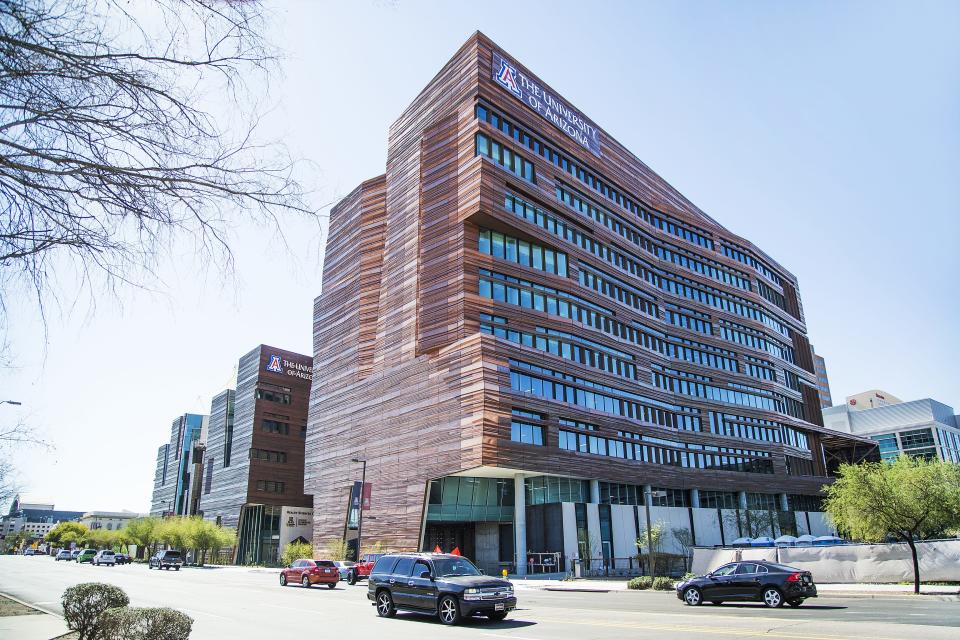ASU to open medical school, regents commit $30 million to develop health care workforce
Arizona State University will create a medical school as part of a $30 million effort by the state's public university system to fill gaps in Arizona's health care workforce, officials announced Thursday morning.
“We are focusing our full energy and innovation on improving Arizona’s health outcomes," said ASU President Michael Crow. “We must generate knowledge at a scale that will impact society."
With the school, which will be known as the ASU School of Medicine & Advanced Medical Engineering, the university joins just a handful of degree-granting institutions that currently offer medical programs in the Copper State, including the University of Arizona, which founded the first medical college in the state in 1967.
ASU will also create a new school focused on public health technology, launch a research initiative called the Arizona Health Observatory to spot and tackle health trends in the state, expand bioscience and nursing research output and grow its existing research partnership with the Mayo Clinic, which operates its own medical school in Arizona with campuses in Scottsdale and Phoenix.
The news comes while Arizona faces a deep shortage of health care workers as its population continues to boom. ASU's new school is just one of the steps that state universities will take in the coming years to address that gap.
The Arizona Board of Regents, which governs the three public universities, is also urging the University of Arizona and Northern Arizona University to confront the issue. The regents' plan, dubbed AZ Healthy Tomorrow, gives money to the schools for increased bioscience research, health care workforce development and expansion of partnerships with private sector medical providers.
"This meets the moment," said Board of Regents Chair Fred DuVal, who framed the initiative as the regents taking responsibility for public health outcomes in Arizona. "It meets the need."
At a board meeting in April, University of Arizona President Robert Robbins said the school hopes to double the number of new doctors it graduates through its medical school. Its 2026 class consists of roughly 240 students split between its Phoenix and Tucson campuses.
Northern Arizona University is set to give a presentation in the fall on how it will contribute to the new initiative. The school already offers degrees in a variety of health care fields, including nursing and physical therapy.
Solving the state's health care gap
A report prepared for the regents found that Arizona's worker-to-population ratio is below the national average in nearly every health care profession.
The state needs thousands of new nurses, doctors and other health professionals to close existing gaps, particularly in rural areas, according to the report.
Those findings correlate with other research documenting shortages of health care workers and a lack of health care access across much of Arizona. State officials have tried to tackle the problem through various programs, including loan repayment programs for medical professionals who serve two-year stints in underserved areas.

Still, the shortage persists. A 2022 report from the Arizona Department of Health Services found that 82 of the state's 126 primary care areas, 65%, were medically underserved. Nearly 40% of Arizonans live in an area with a shortage of health care professionals, according to the department.
That same year, the U.S. Centers for Disease Control and Prevention surveyed more than 8,000 adults in Arizona. Its researchers found that 13.5% reported lacking health care coverage, 28.7% reported lacking a personal doctor and 14.1% reported that medical costs were a barrier to seeking care.
Details remain sparse on new schools
As Crow presented his plan to regents and the press, he cautioned that the medical school was still in the "earliest stages of conceptualization."
He couldn't give an exact timeline on when the medical school or public health technology school might open, saying only that the latter is farther along and that ASU will aim to launch it "as soon as possible." The medical school will need accreditations that he and other ASU officials expect will take more time, with estimates ranging from one to three years.
Now that Crow has presented the plan to the board and has the regents' blessing, he said he will move into "ramp-up mode" for the medical school.
He said he expects that most of the physical spaces for the medical school will be concentrated in downtown Phoenix and that he estimates it will take around $50 million in seed funding to start.
To staff up both schools, ASU officials anticipate that they will draw from their existing faculty as well as make new hires.
Furthering legacies
The new initiative furthers a family legacy for Fred DuVal.
His father, Merlin DuVal, was a surgeon and served as the first dean of the University of Arizona's medical school when it opened its doors. At the time, the school was contentious. Many high-ranking Arizona officials, including several regents, opposed its location in Tucson and its expense.
In contrast, ASU's new medical school comes with backing and goodwill from the board.
The addition of a medical school also burnishes the legacy of Crow, who has championed growth throughout his roughly 20-year tenure at ASU.
He's previously said he sees the expansion as part of the school's birthright, dating back to when it was first voted into existence. In recent months, the university has announced growth on its West Valley campus and an expansion of its design and art offerings through a partnership with the Fashion Institute of Design and Merchandising in Los Angeles.
Sasha Hupka covers higher education for The Arizona Republic. Do you have a tip on Arizona's universities, community colleges or trade schools? Reach her at sasha.hupka@arizonarepublic.com. Follow her on Twitter: @SashaHupka.
This article originally appeared on Arizona Republic: Arizona State University announces plans to create medical school


